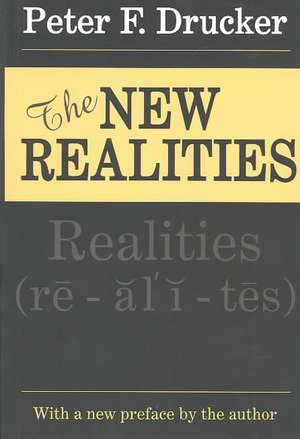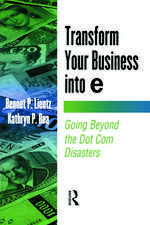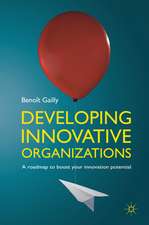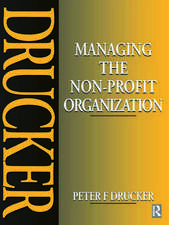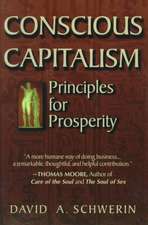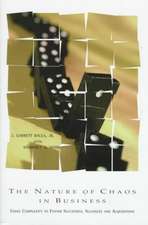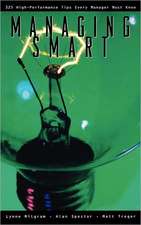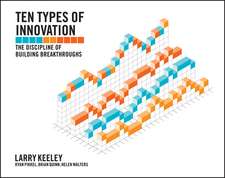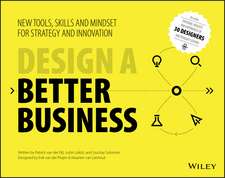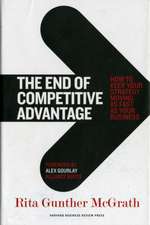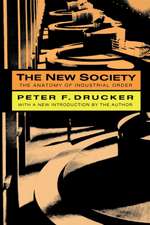The New Realities
Autor Peter Druckeren Limba Engleză Paperback – 31 aug 2003
Challenging, insightful, and provocative, Peter Drucker's The New Realities anticipates the central issues of a rapidly changing world. When it was initially published, in 1989, some reviewers mistakenly thought The New Realities was a book about the future, or in other words, a series of predictions. But, as indicated in the title, the book discusses realities. Drucker argues that events of the next thirty to forty years, or even further on, had already largely been defined by events of the previous half-century. Thus, Drucker discusses episodes in world history that had not yet happened at the time of the book's initial publication, such as: the archaism of the hope for "salvation by society" in "The End of FDR's America"; the democratization of the Soviet Union in "When the Russian Empire is Gone"; the technology boom of the 1990s in "The Information-Based Organization"; and the evolution of management in "Management as Social Function and Liberal Art."
Graced with a new preface by the author that discusses both reactions to the original publication of the book and how important it is for decision-makers to consider the past and present when planning for the future, The New Realities is mandatory reading for understanding politics, government, the economy, information technology, and business in an ever-changing world.
| Toate formatele și edițiile | Preț | Express |
|---|---|---|
| Paperback (2) | 261.77 lei 5-7 săpt. | |
| Taylor & Francis – noi 1994 | 261.77 lei 5-7 săpt. | |
| Taylor & Francis – 31 aug 2003 | 415.24 lei 6-8 săpt. | |
| Hardback (2) | 1000.27 lei 6-8 săpt. | |
| Taylor & Francis – 22 sep 2017 | 1000.27 lei 6-8 săpt. | |
| Taylor & Francis – 13 noi 2017 | 1018.82 lei 6-8 săpt. |
Preț: 415.24 lei
Nou
Puncte Express: 623
Preț estimativ în valută:
79.46€ • 84.97$ • 66.25£
79.46€ • 84.97$ • 66.25£
Carte tipărită la comandă
Livrare economică 17 aprilie-01 mai
Preluare comenzi: 021 569.72.76
Specificații
ISBN-13: 9780765805331
ISBN-10: 0765805332
Pagini: 276
Dimensiuni: 152 x 229 x 15 mm
Greutate: 0.43 kg
Ediția:Transaction.
Editura: Taylor & Francis
Colecția Routledge
Locul publicării:Oxford, United Kingdom
ISBN-10: 0765805332
Pagini: 276
Dimensiuni: 152 x 229 x 15 mm
Greutate: 0.43 kg
Ediția:Transaction.
Editura: Taylor & Francis
Colecția Routledge
Locul publicării:Oxford, United Kingdom
Public țintă
AcademicCuprins
Preface Part 1: The Political Realities 1. The Divide 2. No More Salvation by Society 3. The End of FDR's America 4. When Russian Empire is Gone 5. Now that Arms are Counterproductive Part 2: Government and Political Process 6. The Limits of Government 7. The New Pluralisms 8. Beware Charisma: The Changing Demands on Political Leadership Part 3: Economy, Ecology and Economics 9. Transnational Economy - Transnational Ecology 10. The Paradoxes of Economic Development 11. Economics at the Crossroads Part 4: The Knowledge Society 12. The Post-Business Society 13. The Two Counter Cultures 14. The Information-Based Organization 15. Management as a Social Function 16. The Shifting Knowledge Base Conclusion
Descriere
Even in the flattest landscape there are passes where the road first climbs to a peak and then descends into a new valley
Recenzii
'Peter Drucker was the first of the analytical futurists and the first of the management philosophers. And for me he is still the best.'
Wall Street Journal
'His breadth of vision, his internationalism and his sober realism combine to make his analysis of the present and predictions about the future gripping.' The Economist
Wall Street Journal
'His breadth of vision, his internationalism and his sober realism combine to make his analysis of the present and predictions about the future gripping.' The Economist
